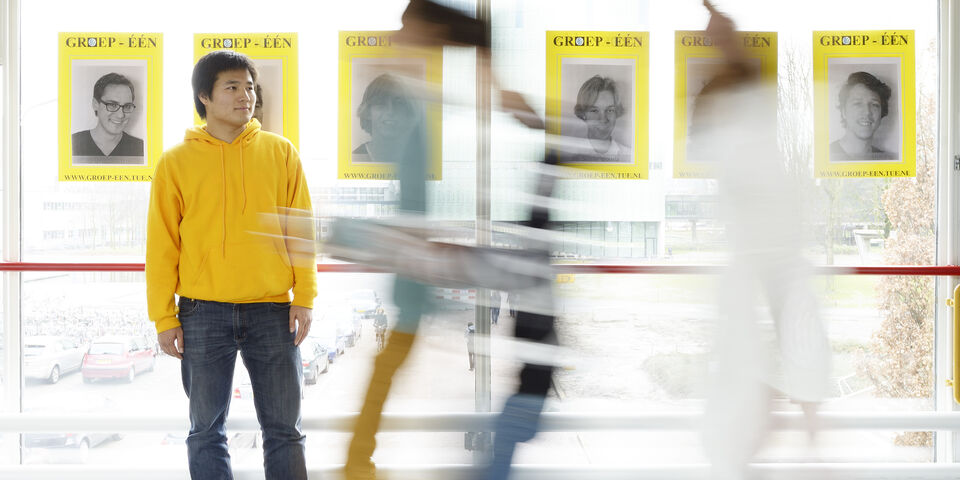Go go, Feng Fang!
He received no less than 173 preferred votes. Chinese student Feng Fang, who’s been studying Innovation Management at TU/e since the summer of 2011, was the only international student on the student party ballots for the University Council. The passionate student is disappointed he didn’t make it into the council despite all the people who voted for him, but pleased he managed to bring internationalization to the attention of the TU/e community.
“My name is Feng Fang. I am the only one international candidate in the election for the University Council. Join me together to make our university more international. If I get selected, the next university council meeting will be in English, which will be the first stepping stone into giving a louder voice to the international community in the campus.”
The above Facebook announcement was part of Feng’s campaign. And witness the 173 students who pressed the digital voting button that had his name on it, it was a successful one. Especially international students displayed their excitement in social media with slogans like Go go, Feng Fang!, and he even received support from the Dutch. Feng: “A Dutch student told me he was definitely voting for me, because he felt so strongly about internationalization. That’s just really cool.”
Early last week we saw enthusiasm and hope, but on Friday we talked to a slightly disappointed Feng Fang. “It’s too bad, but apparently I didn’t receive enough preferred votes. The good thing is a large group of international students has spoken, and it’s obvious they see the importance of a more internationally-oriented university.”
Groep-één had hoped an international student would get them more votes, but they were quite surprised at the high number, says party leader Lars Beke. So why isn’t he allowed a seat in the University Council anyway? Beke: “When we were making the list, we also determined who would be allowed in the council. To deviate from the ballot, someone needs more than half of the simple quota in preferred votes. The simple quota is the number of votes divided by the number of seats. Feng was just a few votes shy. Still, we now realize what internationalization means to the TU/e community, so we’ll be sure to pay attention to that”, Beke promises.
Feng was born in October 1985, which makes him 28 in China – where babies are one year old upon being born – and 27 in the Netherlands. He used to live in Putian in eastern China and studies Pharmaceutical Engineering in Shanghai. Last year he followed his girlfriend who had moved to Tilburg.
The happy-go-lucky Chinese soon discovered certain things are organized differently in the Netherlands. “The Dutch are so-well organized they even have timetables for buses. People are much more on their own over here, and they’re expected to act independently at an early age. In China, parents want to arrange everything for you, even at old age.”
Like most foreigners, he misses his country’s food, although he’s come to appreciate the efficiency of bread in a plastic bag. He was very surprised at the beer culture, and the fact students are allowed to run a bar in a university building. The motivated student was downright shocked when he witnessed the involvement of students; he could hardly believe they had any say at all. “Decisions are discussed over here, which is a major difference compared to China.” Last summer he acted as ‘intro daddy’ with a Groep-één member, and that’s when they started talking about him running for election. “I want to put my two cents in to give internationalization a higher priority at university. Besides, I want to work on my own skills as well, communicative ones for example. Speak better English, meet even more people.” On the one hand, it helped him, and on the other, Groep-één ‘used’ him to win more votes. “A clear case of a win-win scenario”, he grins.
Compared to the university he attended in Shanghai, Feng thinks TU/e is rather international. “There are students from so many different countries here.” Be that as it may, he does see room for improvement. Had he made it into the council, he would have devoted himself to the housing situation for students. “Accommodation can be cheaper if you arrange it yourself instead of having university help you. It’s important to let people know what the possibilities are.” He’d like to see more microwaves at university too, so foreign students and faculty can enjoy a warm meal like they would in their home countries. Another issue is the high tuition fee; Feng would like to see more students receive a scholarship. It’s important to him the move of the Common Room from the Bunker to MetaForum goes smoothly as well. He’ll still be laboring for these causes, but just not as he had hoped. “I didn’t want to be one of the first international students in the University Council, but I did want to be the first one to make a difference.”


Discussion